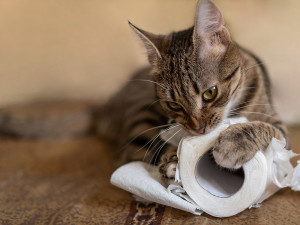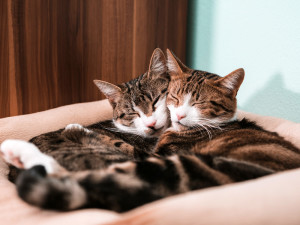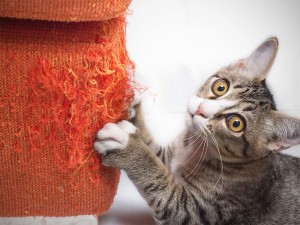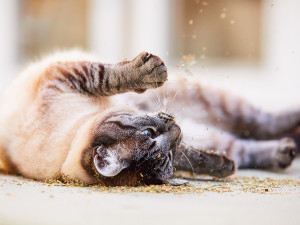Why Does Your Cat Rub Against Your Legs?
And what they’re trying to tell you when they do.

Share Article
In This Article:
Cats Rub to Communicate Most Common Reasons Why Your Cat is Rubbing Against Your Legs Is There Anything To Be Concerned About If Your Cat Is Rubbing Up Against You All The Time? When to Seek Veterinary Support
Cats rub against all kinds of things — furniture, walls, each other, that random thing you just brought home, and yes, your legs. Is it a scent thing? Are they trying to trip you and send you flying down the hallway? There’s rarely one answer when it comes to cat behavior. Let’s look at why your cat rubs against your legs.
Cats rub to communicate
Scent and body language are two important elements of feline communication. Rubbing on your legs covers both.

Let’s start with scent. The ears, cheeks, lips, chin, paws, and backend are key pheromone-producing zones. When a cat rubs on something, chemical pheromones are left behind. This allows them to communicate with other animals. Even after the cat leaves the area their scent remains.
There’s also a physical element to rubbing. The shape of a cat’s tail, their facial expression, how intense or relaxed the rubbing is, etc., are all body language clues to how the cat is feeling.
Most common reasons why your cat is rubbing against your legs
You know it’s about communication. But what exactly is your cat trying to say?
In addition to body language, consider the context. Did you just get home after many hours away? Is your cat bored? Do they seem itchy? Are you wearing new pants, or did you come home smelling like someone else’s cat? All these things provide insights into your cat’s rubbing.
Here are some of the most common reasons your cat may be rubbing. Use context clues to see if you can narrow it down the next time your cat trips you up with a good leg rub.
1. They are scent marking.
Your cat may be rubbing your legs to deposit their scent. Are they saying you “belong” to them? We don’t know for sure. But leaving that scent likely is marking you as an important resource.
If you suddenly have a different smell, like that of a friend’s pet or after working in the garden, your cat may rub to replace that scent with their own familiar scent. Cats also feel comforted by their own scent. Rubbing your legs could be part of your cat’s efforts to surround themselves with their scent in times of stress.
2. They are showing affection.
This is both scent and body language. Rubbing on you means they’re marking you with their scent. And the physical act of rubbing, winding around your legs, most likely purring or meowing, are affectionate behaviors. You’ll often see this when you come home after being away.
3. They are telling you they need something.
Cats are smart enough to know what gets your attention. If rubbing on your legs got you to do something in the past, they remember and will use it again.
You may get a leg rub when it’s time for a meal, or they want you to toss a toy or give them some love.
It can also be an excited “thank you” for something like feeding them. Cats often rub and talk as we’re preparing their food.
4. They are greeting you.
What’s better than a cat meeting you at the front door, purring and rubbing all over your legs? (Maybe if they came with a cup of tea and a cookie…)
That leg rub is a happy greeting. Your cat is excited to see you, perhaps excited for the meal or play they know is coming soon. It does double duty in refreshing the scent that has probably faded since their last rub.
5. They are gathering information
Smelling often comes along with rubbing. Your cat may be depositing scent on you at the same time that they’re gathering any new scents you picked up.
I’m sure you’ve gone to visit a friend with a cat. You come home. Your cat goes to rub you, stops to sniff, and then looks at you like you’ve completely betrayed them. They don’t actually feel betrayed. But they’re learning a little about what you were up to. And they likely want to cover that scent with their own.
Is there anything to be concerned about if your cat is rubbing up against you all the time?
Rubbing is a completely natural, instinctual behavior. In most cases, there’s no need to worry about it. Your cat is simply expressing themselves.
It can be a possible tripping hazard for people with limited mobility. In that case, try teaching your cat other ways to ask for affection and show their love. You can even rub their scent on your legs regularly, so they have less reason to do it themselves.
If the rubbing behavior seems obsessive, as if your cat must do it, and it’s very hard to distract them, it could be related to anxiety. There may be a specific trigger causing stress that you can remove or work on. Play and enrichment are also great ways to reduce stress.
When to seek veterinary support
There can be medical reasons for leg rubbing. Skin irritation, allergies parasites, ear infections, and other things that cause itching or discomfort may cause rubbing.
Your cat may seem stressed when rubbing, as opposed to relaxed and happy. Or they may pay a lot of attention to the areas they’re rubbing on you, like rubbing you with their head and then pawing at their ears. These can be signs of physical discomfort. Time to check in with your vet.
Bottom line
Cats rub our legs for many reasons, including communication, scent marking, and showing their love.
This is normal behavior that usually means your cat is feeling good.
However, rubbing can sometimes coincide with feelings of stress or physical discomfort.
It’s important to look at your cat’s overall behavior, and the context of the situation, for clues to help decipher the meaning of their leg rubbing.
References
Behnke, Alexandra C., et al. “The Effect of Owner Presence and Scent on Stress Resilience in Cats.” Applied Animal Behaviour Science, vol. 243, 1 Oct. 2021, p. 105444, www.sciencedirect.com/science/article/pii/S0168159121002318opens in new tab, https://doi.org/10.1016/j.applanim.2021.105444opens in new tab.
“Greetings: The Meaning of Face Rubbings.” Feline Forum, Cornell College of Veterinary Medicine. https://ecommons.cornell.edu/server/api/core/bitstreams/313fb903-8cf2-40e4-8841-fb46860c2ef0/contentopens in new tab.

LeeAnna Buis, CFTBS, FFCP
LeeAnna Buis has adored cats her entire life and thought she knew them inside out and sideways. But it wasn’t until she worked with a feline behavior consultant that she fully understood how incredible, complicated, and inspiring they really are. She made a career change, starting the certification process to become a behavior consultant right away. She discovered what unique, fascinating, complex creatures cats are and knew this was what she wanted to do with her life — help others on a similar journey to truly knowing, loving, and appreciating their cats.
LeeAnna earned her certification through Animal Behavior Institute, where she received the certified feline training and behavior specialist (CFTBS) designation.
Related articles
Begging for Belly Rubs? Why Your Cat Likes to Have Their Belly Scratched
That’s right—belly rubs are not just for dogs.
![Cute tabby cat playing with roll of toilet paper.]()
How to Spot, Treat, and Prevent Pica in Your Cat
There may be a reason your cat can’t stop putting your hair ties in their mouth.
![Two tabby cats in embrace lying in cushion.]()
What Are Cat Pheromones and How Do They Work?
Communication is key, and pheromones are your cat’s version of DMs.
![Kitten scratching fabric sofa]()
How to Stop Your Cat From Absolutely Ripping Apart Your Couch
Placing a cat tree or post in a room only, uh, scratches the surface of solving this problem.
![A cat rolling around in catnip on the floor.]()
Get This: While Your Cat Is High on Catnip, They’re Also Repelling Pests
Duuuude...where are the mosquitos?
Why Do Cats Put Their Butt in Your Face?
Oh, hello.








